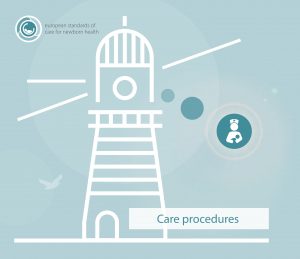A guest article by Dr Susanne Rücker, paediatrician , Hospital “Dritter Orden”, Munich, Germany

Observing the little patient’s needs: NIDCAP in practice © Klinikum Dritter Orden, München
Developmental care is a paramount aspect in the care of preterm babies. Being a neonatal unit providing maximum medical care, this approach has always been an important factor in the provision of care for our patients. However, there has not been a comprehensive concept in operating developmental care that has been applied uniformly.
It was hence our wish to implement a programme for developmental care that includes family-centred care from the start. EFCNI made us aware of the FINE (Family and Infant Neurodevelopmental Education) programme – a structured training for family-centred developmental care based on NIDCAP (Newborn Individualized Developmental Care and Assessment Program). Due to a donation by EFCNI in 2016, we were able to host a NIDCAP training with a team of NIDCAP coaches from Rotterdam and Tübingen, in our clinic. The two-day-workshop imparted scientific principles, strategies in care provision while observing the babies’ reactions to it, as well as the role of the family in the spectrum of care. Another training module enabled our staff, within the scope of Bed-Side-Observation under supervision, to gain extensive knowledge in observation of behaviour which is essential if one aims at providing individualised care.
After the workshops were finished, we were facing the task to implement what we had learned into our daily clinical routines.The first initial steps in early 2017 were to set up a task force that was in charge of coordinating the activities and projects related to NIDCAP. Moreover, they developed a concept for internal coachings, to train more staff according to the new concept. It is our goal to establish the optimal environment for our small patients, so they have both calm surroundings and adequate stimulation for the best developmental outcome possible. Procedures are being questioned critically and continuously adapted. We did, for instance, introduce a stress-and pain-management as well as measures to reduce noise in the unit and advanced the possibilities to provide Kangaroo Care. All these steps have already shown to have a positive impact on our patients. The family is in the focus because it is our aim to empower the parents as they know their child’s needs best and intuitively react in the right manner given that we have included them from the very beginning in the care for their baby. We want to enable mothers to be the primary care givers for their child(ren) as early as possible and the early and successful discharge rates proof us right in doing so. Furthermore, we introduced 24/7 access for siblings to the unit, so they can be part of their brother’s or sister’s care.

Graphic: © efcni
Implementing NIDCAP into our daily NICU procedures is facing two main challenges: one is staff shortage the other is raising awareness for the benefits of this care procedure: NIDCAP and its individual approach as well as the shift of responsibilities from the clinical staff to the parents, demands a change of thinking. Implementing such a programme does require persistence and a lot of patience. We are however convinced to be on the right track. We already realised changes that have become irrevocable practice: We wish to optimise the care in labour and delivery unit as well as in our neonatal nurseries in the future and want to offer a NIDCAP training to some of our staff.
Please click here for the German original article.

